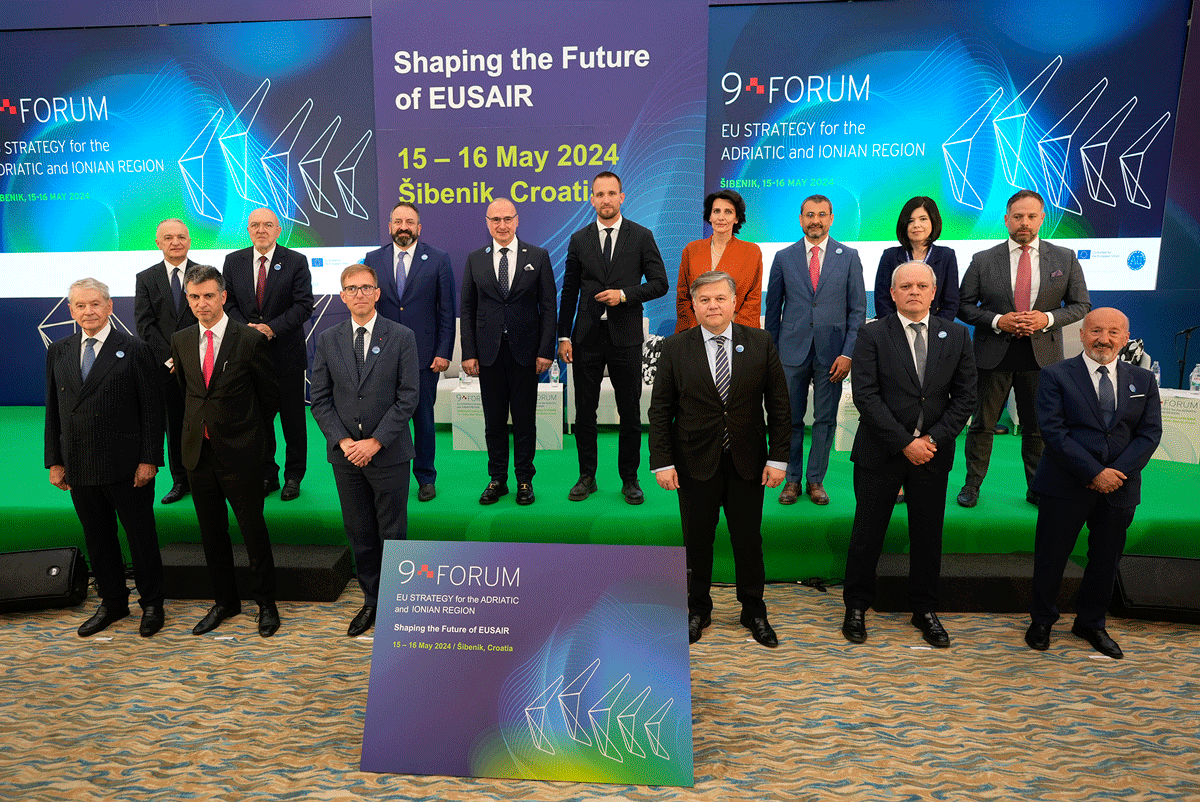
From the 15 to the 16 of May, the EU strategy for the Adriatic and Ionian Region convened in Šibenik under the Croatian presidency. Established in 2014 as one of four EU macro-regional strategies, EUSAIR aims at fostering cooperation among countries in the Adriatic-Ionian region. EUSAIR involves four EU Member States (Croatia, Greece, Italy, and Slovenia); five candidate countries (Albania, Bosnia and Herzegovina, Montenegro, North Macedonia, and Serbia); and one third country (San Marino).
By providing political and financial support, bolstering regional cooperation, and promoting shared values, the strategy fosters a sense of regional identity that transcends national borders and creates a solid base for furthering European integration in the Western Balkans. Thus, EUSAIR represents a game changer in facilitating the adoption of EU standards and practices by the candidate countries in the Western Balkans.
This year’s Strategy Annual Forum exemplified the importance of EU macro-regional strategies in achieving broader European integration objectives. The common future of the region topped the forum’s agenda, focusing on enlargement and the youth that will benefit from it.
Some 700 people from across the Adriatic and Ionian region attended the forum, including civil society members, students, business leaders, regional and city representatives, and Interreg programmes, demonstrating the forum's inclusive nature and public engagement with its topics.
Transitions and Social Cohesion
The forum provided a platform to strategise future actions on critical issues such as sustainable tourism, environmental protection, and regional connectivity—key for the Adriatic-Ionian Region's socio-economic development and Western Balkans' stability. Increased cooperation on these matters is the key to unlock untapped economic potential in the region and shape a sustainable transition towards competitive and resource-efficient economies.
Delegates also discussed the role of cohesion policy, Interreg, EU enlargement, and relations with the EU’s neighbouring countries, emphasising greater alignment between EUSAIR and EU policies, in particular the instrument for pre-accession assistance (IPA).
Discussions centred on five pillars: blue growth, connecting the region, environmental quality, sustainable tourism and social inclusion, all underscored by the need to foster greater cooperation and more sustainable practices. Resilience in the face of future challenges highlighted the need for skilled workforces, lifelong learning, decarbonisation, energy efficiency, biodiversity conservation, and regional cooperation to build a robust, adaptable, cooperation framework.
Miloš Prica of the Ministry of Foreign Affairs of Bosnia and Herzegovina remarked on the forum’s timeliness and pertinence, citing themes such as "EU enlargement, business upgrades, youth involvement in businesses, and digitalisation."
Examining EUSAIR's alignment with cohesion policy post-2027, social cohesion complemented other topics and emerged as the lynchpin of a more inclusive Europe during the green and digital transitions. The European Commission praised the Croatian Presidency for "bringing together the revision of the strategy, coordinating the different pillars, and putting forward a proposal for a revised action plan," which includes cross-cutting issues and a new pillar on social cohesion.
Youth Participation in Policymaking
Youth participation was a central theme of the forum, featuring the 6th Adriatic-Ionian Youth Organisations’ Forum and an event on the EUSAIR Youth Council. The council will provide young people with a platform for active participation in policymaking, with its establishment planned for autumn 2024. Discussions focused on empowering the region’s youth to further strengthen civil society in the Western Balkans and foster a transparent and participatory political environment.
Simona Mameli of the Italian Ministry of Foreign Affairs explained, "The sustainability of the strategy lies in youth inclusion. We have completed the youth consultation process and approved the concept note. The call for participants is going to be closed, and very soon we will have the first Youth Council." This initiative will contribute to the Western Balkans’ progress towards EU membership.
Passing the Baton
The forum concluded with the handing of the EUSAIR presidency from Croatia to Greece. Greece began its term with a commitment to finalising the revision and implementing the new action plan. Summarising the Croatian presidency, Pavle Janković of the Serbian Ministry of Foreign Affairs said, "Croatia proved throughout its chairmanship of both EUSAIR and the Adriatic and Ionian Initiative to be a champion of the European integration of the remaining EUSAIR countries that aspire to full EU membership."